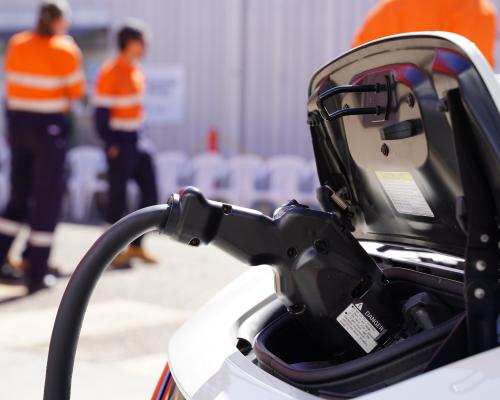
9.59pm BST
The number of battery electric vehicles sold in Australia hit a record high in the three months to 30 June, with sales increasing by 63% when compared to the first quarter of 2025.
Data compiled by the nation’s peak motoring body shows 29,244 battery electric vehicles were sold in the latest three month period, up from 17,901 registered sales.
Battery electric vehicles accounted for 9.3% of all new cars sold during this period, according to the Australian Automobile Association (AAA), up from 6.3%.
The number of internal combustion engine cars increased from 205,911 to 226,306 during this period. But the market share of petrol and diesel cars remained steady at 72% thanks to the increase in electric and hybrid sales.
“In the first half of 2023, battery electric vehicles outsold hybrids nationally, but since then hybrids have outsold battery electric vehicles in eight consecutive quarters,” the AAA research said.
Medium sized SUVs remain Australia’s most popular car and represent almost a quarter of all new light vehicles sales. Around 20% of these were battery electric vehicles.
A total of 314,185 new cars were sold during the three month period, up from 284,538 in the first quarter of 2025.
9.53pm BST
Almost half of Australians experience cyber crime, study finds
Nearly half of Australians experienced some form of cyber crime last year, with the federal government urging people not to reuse online passwords and make sure they have multi-factor authentication on devices.
Some Australians are getting more confident in identifying online crime, which is leading to focus less on protective behaviours, with a whopping 22% of people experiencing identity crime
The Australian Institute of Criminology said online abuse, identity theft, malware and scams were the most common forms of online crime experienced last year. Their new report, Cybercrime in Australia 2024, was released this morning finding 9.5% of Australians were victims of fraud or online scams.
Another 26.8% experienced online abuse or harassment, 21.9% were victims of identity crime, and 20.6% encountered malware attacks.
“While some types of cybercrime declined compared with 2023, the report found protective behaviours — such as using strong passwords and security updates — remain worryingly low,” said Tony Burke, the minister for home affairs and cybersecurity.
The AIC report found only 50% of people used unique passwords for their online accounts, down from 53% the year before. Only 58% of people used multi factor authentication to login.
“Respondents were more confident in their knowledge of technology in 2024 than in 2023, which may lead them to place less importance on protective behaviours,” the AIC said.
Burke said Australians should take more care.
“Remember these three simple steps to stay safe online – always install the latest software updates, use unique passphrases, and enable multifactor authentication wherever it’s available,” he said.
9.30pm BST
Welcome
Good morning and welcome to our live news blog. I’m Martin Farrer with the top overnight stories and then my colleague Nick Visser will be in the hot seat.
Almost half of Australians experienced some form of cybercrime last year, according to a study by the Australian Institute of Criminology, with close to 22% of people experiencing some sort of identity crime. In response, the federal government is urging people not to reuse online passwords and make sure they have multi-factor authentication on devices. More details in a minute.
The number of battery electric vehicles sold in Australia hit a record high in the three months to 30 June, with sales increasing by 63% when compared with the first quarter of 2025. Figures from the AAA shows 29,244 battery electric vehicles were sold in the latest three-month period, up from 17,901 registered sales. It comes as we report this morning that the government is ready to introduce road charging for EV drivers to make up for the decline in revenue from petrol sales. More coming up.






